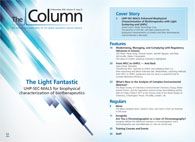Are You a Chromatographer or a User of Chromatography?
Incognito defines the difference between a chromatographer and a chromatography user and elaborates on why we should care.
Photo Credit: lightpoet/Shutterstock.com

Incognito defines the difference between a chromatographer and a chromatography user and elaborates on why we should care.
Which one are you and what’s the difference? Well the difference is critical, and is being discussed on a global scale because, as we industrialize our equipment and processes, it’s much easier to be a chromatography user, but it’s a different thing to be a chromatographer.
Before I get into the detail, I just want to say that my use of the term chromatography user doesn’t always imply a lesser type of chromatography laboratory staff member, but sometimes it does.
So where and who are chromatography users? If you have ever used what is more commonly called an “open-access” chromatography system to perform an analysis, such as reaction monitoring or a routine assay, then you are probably a chromatography user, and you are using the technique as a means to an end. Chromatography and analytical science probably aren’t your main job function - you may be an organic chemist looking to monitor extent of reaction or the development of impurities or occurrence of side reactions using chromatography.
That’s all fine, and there are more and more people who will fall into this category because the equipment and control software is now so mature, automated, and robust that we can offer it to those folks who have little knowledge of how it works, but who can still use it to obtain useful information. They are essentially using chromatography as a tool to aid their primary job function, and are using predefined instrument setups, acquisition, and data analysis methods to provide data, from which they will make decisions about their work.
However, the very fact that the instruments and software are becoming more mature and therefore more reliable and easier to use means that more and more people who are performing chromatography as their primary job function are, in fact, chromatography users, as opposed to chromatographers.
So the big questions are - what’s the difference between a chromatographer and a chromatography user and what impact does this have?
One of the big questions I have is how chromatography users assess the quality of their data? How do they assess the fitness for purpose of the data acquisition and data analysis settings for their particular sample? I know that open access methods are well managed and quality regulated - often by a chromatographer - in most companies, but the dislocation between the required data and the knowledge of chromatography can present problems when it comes to what can and can’t be implied from the data generated. Examples that I have seen include failure to apply (or appreciate) response factors to data and assuming an equimolar response; inadequate calibration, which leads to improper estimation of detection or quantitation limits; problems with chromatographic integration or obvious (to a chromatographer) signs of chromatographic issues such as peak shape deformation; significance of fragment masses in qualitative gas chromatography–mass spectrometry (GC–MS) and the estimation of incorrect structures; and the use of adducts ions rather than a protonated or deprotonated molecular ion in liquid chromatography–mass spectrometry (LC–MS) to assign analyte molecular weight during structural elucidation.
I also find that chromatography users often care less about the equipment, quality of data, and longevity of the testing platform. This may seem harsh, but you only have to operate in a shared services facility or open access environment for a short while to see the terrible state of the samples that are analyzed by these systems, the number of systems walked away from when a simple tweak (releasing air bubbles from a high performance (HP)LC pump or further conditioning a GC column) would have sorted out the problem, the number of HPLC systems with no eluent in the reservoir (suggesting the system ran dry), and a host of other nasties that would make a chromatographer’s skin crawl. It is just a fact that lack of knowledge and emotional investment in the technique mean that (often) less care is taken. Chromatography users will rarely be asked to fix or even prepare a system, therefore they are less affected by breaking it and they can typically go on and use an alternative system. If you don’t believe me - go and ask the person who is in charge of your open access facility.
So what makes a “chromatographer” so different? I think it essentially comes down to an appreciation of the technique, both the theory and the practice. It’s the knowledge required to make a chromatography system work well and successfully apply the technique to a broad range of application areas. It’s being able to troubleshoot a system and have the satisfaction of figuring out what’s wrong and getting it going again. It’s the ability to appreciate when the data is fit for purpose and when it is not. It’s a thirst for knowledge about the underlying principles and theories and how they can be used in practice to produce better quality results.
I’ll also tell you that being a chromatographer has little to do with experience, or the number of years served or a lifetime of experience - it’s really to do with the love of the subject, of separation science in general. After only a short while, I can see, in each new intake into a company, or students in a class or clients in a consulting exercise, who the chromatographers are and who aren’t.
I know I sound like a sentimental old veteran with 30+ years of experience in an industry, reflecting back on the good old times when everyone cared and we “did things properly”. That’s as maybe, however, I do know that no matter how robust you make a system, how fancy the covers are that you put on it, how “feature rich” the data system is, you still have to know about chromatography to develop, implement, and monitor quality chromatographic output. Make no mistake, if you are reading this column, the output from your separation science experiments will be important to your company and they are relying on you to get it right and here is where the big issue is.
You may have missed it when you first read this, but I’m stating that in my opinion the analytical laboratories in many companies are staffed by chromatography users, sometimes but not always, supported by a chromatographer. I’ll say it again: the analytical facility in some companies is staffed, sometimes entirely, by folks whose knowledge, dedication, and passion is only just enough to, sometimes, produce fit-forâpurpose data or keep the facility running, without the remotest possibility of being able to develop new methods or advance the scientific capability.
I’m going to leave you with that thought and the implications that it has, and would ask that you contact me with suggestions on what might be done to reverse this situation and to protect our science from becoming an industry.
Contact author: Incognito

A Final Word from Incognito—The Past, Present, and Future of Chromatography
February 10th 2022After 14 years in print, Incognito’s last article takes a look at what has changed over a career in chromatography, but it predominantly focuses on what the future might hold in terms of theory, technology, and working practices.
Sweating the Small Stuff—Are You Sure You Are Using Your Pipette Properly?
October 7th 2021Most analytical chemists believe their pipetting technique is infallible, but few of us are actually following all of the recommendations within the relevant guidance. Incognito investigates good pipetting practice and busts some of the urban myths behind what is probably the most widely used analytical tool.





